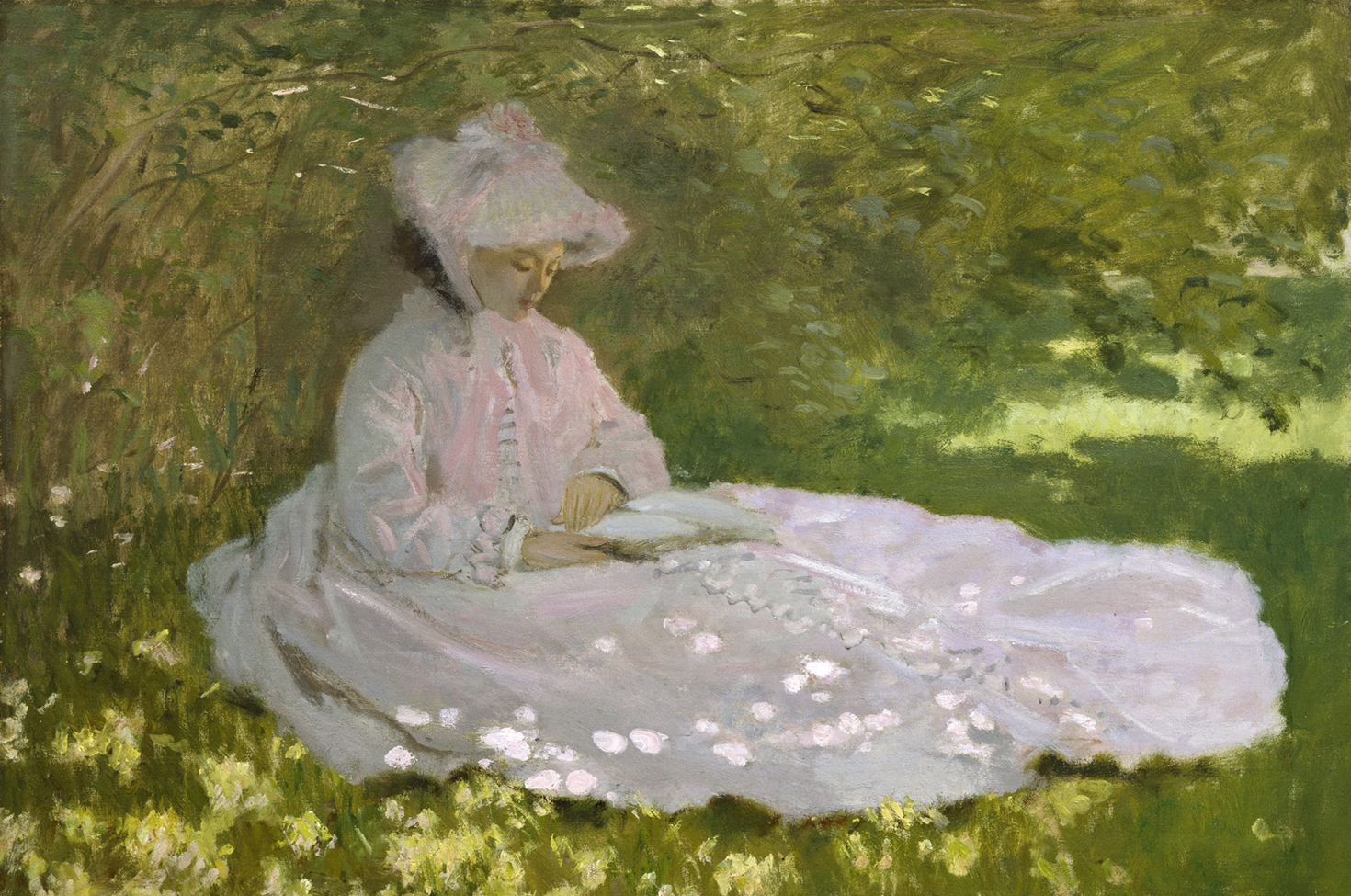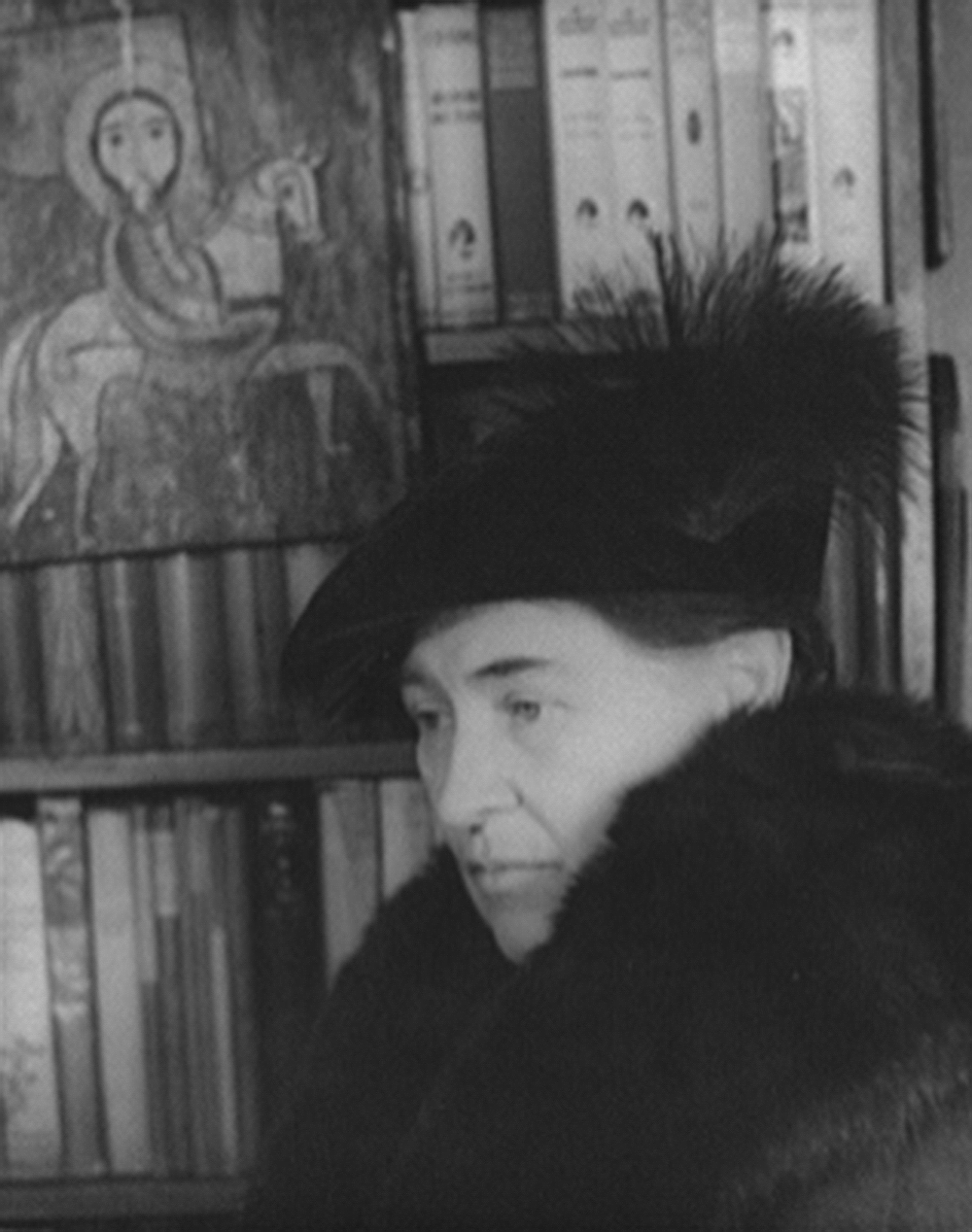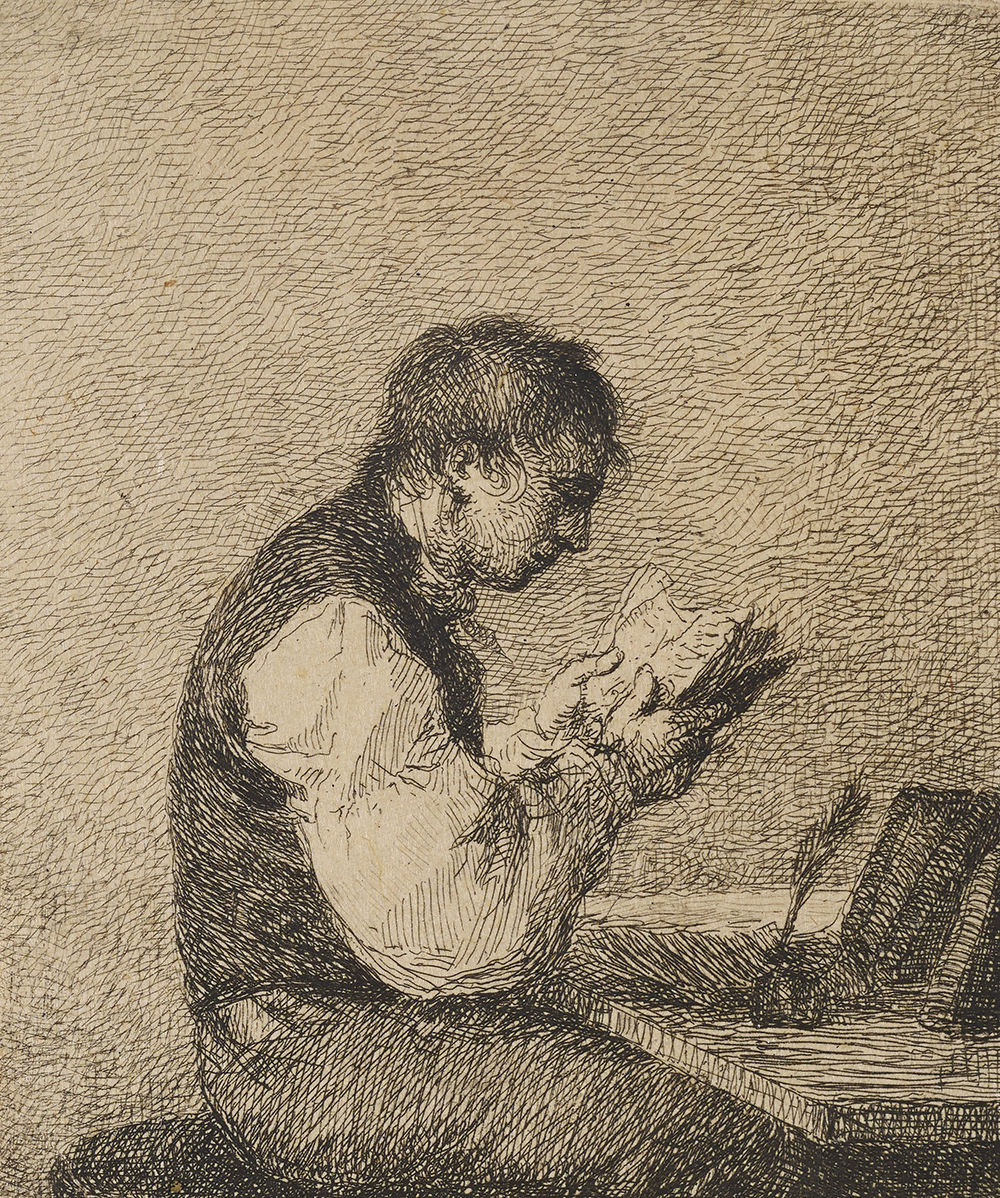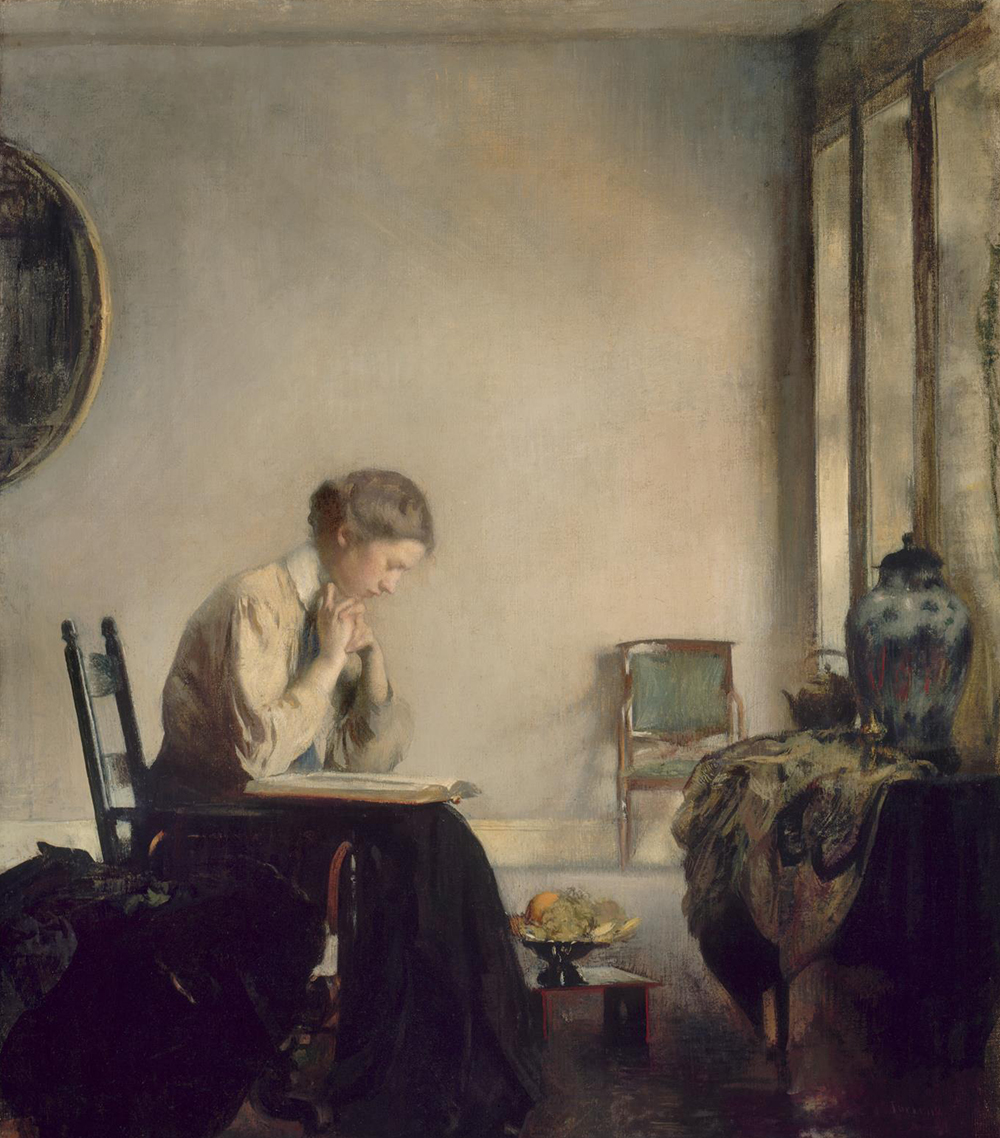
Springtime, by Claude Monet, 1872. The Walters Art Museum.
“Books,” Willa Cather wrote once, “are the only masterpieces that the poor man can have as well as the rich.” The author of My Ántonia and O Pioneers! loved many of those masterpieces and despised many more, opinions stated in the newspaper columns she wrote frequently at the beginning of her career, and later sharing her thoughts in letters as she grew older. Below are a small assortment of those thoughts.
Robert Frost
On December 17, 1915, Cather wrote a letter to Robert Frost, then forty-one years old and at the beginning of his fame.
Your two books contain the only American verse printed since I began to read verse in which I have been able to feel much interest—the only verse of highly individual quality. The appearance of such verse seems to me a very important event, and the warmth of appreciation which it kindles in one is a pleasure to feel…if Ezra Pound and Mr. Masters are poets, clearly you are none.
The French
In November 1929, Cather responded to Albert G. Feuillerat, a Yale professor of French who was writing an article on her for Le Figaro. Feuillerat had asked if her work was influenced by nineteenth-century French writers. She replied,
Your inquiry regarding a possible French influence is hard to answer. I began to read French when I was fifteen or sixteen, and for a great many years enjoyed the French prose writers from Victor Hugo down to Maupassant much more than I did English writers of the same periods…almost any French prose seemed to me a little better than English prose, quite apart from the quality of the writer. Before I was twenty I had read all of the novels of Balzac a good many times. Now I do not read him very often. I don’t think I ever longed to “imitate” one French writer more than another, but in all the great French writers I have felt a greater freedom than in English writers of the same period; they experimented more often and had a wider range of variety—usually they seemed a little more direct and sincere. About nearly all the fine old English novelists (before Thomas Hardy) there is a curiously professional tone toward the reader, a joviality a good deal like that of the landlord welcoming guests at an inn. When I was much younger this tone irritated me, I remember. I do not mind it so much now; it seems a manner like any other manners, but perhaps the absence of this conventional geniality in French novelists pleased me, beside their range of interest was so much wider—their theme was not always the same story of how someone got settled in life.
After she read over this paragraph, she concluded that it might have amounted to little more than throat clearing.
I have written a long letter and yet I have told you very little of what I mean. I think I must always have cared for something nervous and direct and supple in French prose itself, when I was too young to think about it or reason about it. It excited me more than English prose, just as the air in high altitudes always makes me feel better and stronger than the air at sea level.
The Russians
“I think the two greatest writers of fiction in modern times were Count Tolstoi and Ivan Turgenev, and I think they were equally magnificent in the achievement,” Cather wrote to a correspondent named Mr. Miller in October 1924. “Their methods were absolutely opposite, and I think both methods are entirely admirable.”

Fanny Butcher, a literary critic at the Chicago Tribune, later asked Cather which book she wished she had written. Cather wrote back in January 1941: “I suppose you mean what novel? Well, since it’s a wishing game, why be modest?”
I imagine you expect me to name some neat obscure book, by some neat obscure talent. To be really chic I ought to say that I’d love to be responsible for the high-flying rhetoric of Moby Dick, where one metaphor about the Musee de Cluny and the human soul runs to the length of a page and a half.
Thank you! If I can choose, I won’t meekly say that the neck of the chicken is my favorite portion. I’d rather have written War and Peace than any other novel I know. I am not sure that I admire it more than any other, but I’d rather have written it. Simply for the grand game of making it, you understand, quite regardless of the result. I would like to be strong enough to have, and to survive, so many gloriously vivid sensations about almost everything that goes to make up human society. I would like to have had that torrent of life and things pour through me; and yet to be well-bred enough as an artist to unconsciously and unfailingly present it all in scale, with the proper perspective and composition and distribution of life; enough, at least, to hold the thing together. That much form, it seems to me, any satisfying work must have.
Ernest Hemingway
“Have you read Hemingway’s book [Death in the Afternoon]—of course you have,” Cather wrote to wealthy arts patron Mabel Dodge Luhan in November 1931. “Don’t you find it quite stunning?”
Her esteem may not have been matched by his. Hemingway had previously complained about Cather’s World War I novel One of Ours, writing in a letter that he recognized her battle scenes from Birth of a Nation.
Robert Louis Stevenson
Willa Cather had many opinions about what a young boy should read, which she unfurled regularly in her newspaper columns. In a December 1897 column, she wrote:
I received a few days ago a letter from one of our readers asking what book I would most highly recommend for a boy of fourteen. Of course, there is no “best” boy’s book, but I replied without hesitation Robert Louis Stevenson’s Treasure Island. That is one of the boy’s books destined to immortality. It will be read as long as there is youth and courage and boyish enthusiasm in the world…When a boy once begins the book he is not happy until he has finished it, and then he is unhappy because there is no more of it to read.
In May 1897, she offered more advice for the person trying to get a young boy to read:
Do you happen to have a boy who doesn’t like to play quite as well as his brothers do, who hunts the quiet corners with a book and who reads The Arabian Nights under his desk at school, while his geography lies neglected on top of it? If you have, don’t discourage these performances too much. It is a good thing to know geography, but for some purposes it is even better to know The Arabian Nights. You can never tell to what good things a taste for imaginative literature will lead a boy. But on the other hand don’t encourage him too much. Don’t make him think that he is the only boy in the world who has loved to read those dear old Arabian tales, or he will soon grow to be a very pedantic and unlovable boy indeed. And above all things don’t lead him to believe that because he likes to read fine stories he will necessarily write them someday. If he tries his hand at writing stories “sit down” on him.

Mark Twain
Another author for the boys, according to Cather—as long as you choose the book wisely.
What a red-letter day it is to a boy, the day he first opens Tom Sawyer. I would rather sail on the raft down the Mississippi again with Huck Finn and Jim than go down the Nile in December or see Venice from a gondola in May. Certainly Mark Twain is much better when he writes of his Missouri boys than we he makes sickly romances about Joan of Arc. And certainly he never did a better piece of work than The Prince and the Pauper.
Henry James
In December 1896, Cather wrote a review of The Other House that could be seen either as an extended compliment for Henry James’ writing or an extended burn of his work— perhaps a bit of both.
It is not every day that a book by a really great artist is capable of making a sensation. And of all men under heaven Henry James is the last man who would be expected to arouse any excited admiration in the mind of the public at large, yet he has done it. Yes, I repeat it, Henry James has made a sensation! Will wonders never cease? For many years Mr. James has contented himself with the devout admiration of the very, very few. He has gone on quietly producing perfect masterpieces of style, but eschewing the strange emotion[s] of humanity as if he were a little afraid of them or considered them somewhat vulgar…But aside from his delightful reflection there was little to hold the average reader. He thinks too much, which is fatal to a novelist’s popularity.
Women
As is the mandate of many columnists forced to produce quick copy that people will rush to read, Cather had many opinions that read like they are forged from steel but may not have been thought out much before their finished shape was presented to readers.
“I have not a great deal of faith in women in literature,” she wrote in a November 1897 Pittsburgh Leader column. “As a rule, if I see the announcement of a new book by a woman, I—well, I take one by a man instead. This may be a very narrow prejudice; I do not defend it. It is merely a personal feeling. I have noticed that the great masters of letters are men, and I prefer to take no chances when I read.”
Two years earlier, in a review of a book by Ouida for the Nebraska State Journal, Cather had offered a kind of explanation for her prejudice.
Women are so horribly subjective and they have such scorn for the healthy commonplace. When a woman writes a story of adventure, a stout sea tale, a manly battle yarn, anything without wine, women, and love, then I will begin to hope for something great from them, not before.
Hermione Lee writes in her biography of Cather that
Her appropriation of a male tradition—an appropriation which had everything to do with her sexual alienation from conventional femininity—made her work unique. Virginia Woolf’s well-known ideal of the artist with an androgynous “man-womanly” mind, in A Room of One’s Own (contemporaneous with Cather’s great novels of the 1920s), finds its best illustration, in an American context, in Willa Cather’s writing.
There were, of course, exceptions that Cather found to prove the rule: Charlotte Brontë and George Eliot—who once wrote an essay titled “Silly Novels by Lady Novelists.” As she wrote in that 1897 column:
There have been other women who have done wonderfully clever things in fiction, but these two were unquestionably masters of the craft, preeminently great. A book is precious to me for what it means to me, not for what it means to cleverer persons than I. And of all George Eliot’s masterpieces give me that one in which she touched the hearts of the people, The Mill on the Floss. There may be other books which we admire vastly more, but this is one of the things which we take into our hearts, which becomes associated with all that is best in our lives and as dear to us as the places and memories of our childhood.
In previous column from May 1897, she fell into another tangent on The Mill on the Floss, which led to an ode to books that could have felt timeless if not for inflation.
Speaking of Tom and Maggie reminds me that there are just plenty of people who have never read The Mill on the Floss. And yet you can get it for fifteen cents anywhere. It is a queer thing, the inexpensiveness of books. You have to pay ridiculous prices to hear good music, and painting and statues cost fortunes. But you can get just as good a copy of The Mill on the Floss as you need for the price of a dish of ice cream. Think of the labor it cost George Eliot to write that book, of the lifelong study it cost her to be able to write any such book, and you can get the results of all her genius and pains for a sum too insignificant to mention. That is why literature is most truly the art of the people. Books are the only masterpieces that the poor man can have as well as the rich. They are cheaper than meat and flour.
In July 1891, an eighteen-year-old Cather, not quite adept at spelling, wrote a letter to her friend Mariel Gere about her doings and readings, already submerging herself in the words of a writer focused on rural life.
I feel awfully lonesome since all you fellows are gone, and am consoling myself with French History, Gorge Eliot, and endless rides over the prairie.

Jane Austen
There were other exceptions to the list of other women worth reading, judging from a letter Cather wrote in September 1927 to her friend Louise Guerber Burroughs. Or perhaps Cather was just getting older and had become a literary figure herself—instead of one eager to learn everything she could from literature by taking it apart and often tearing it down. She was walking about frequently in the early autumn air, perhaps trying to forget that she was longing for a good book to read.
I’m really desperate. I have nothing on earth to read. Won’t you please see if you can get me Jane Austen’s Sense & Sensibility in a fairly good type—not the European edition, that’s too small type—and rush it to me “special handling”? Then I’ll get it about Monday, maybe. Knopf keeps wanting to send me new books—but there is not one in his fall list that I want.
For other writers’ thoughts on other masterpieces, dive into past entries in our reading list series: Julia Ward Howe, Walt Whitman, Virginia Woolf, Frederick Douglass, Sylvia Plath, Theodore Roosevelt, Nella Larsen, Flannery O’Connor, and Emily Dickinson.